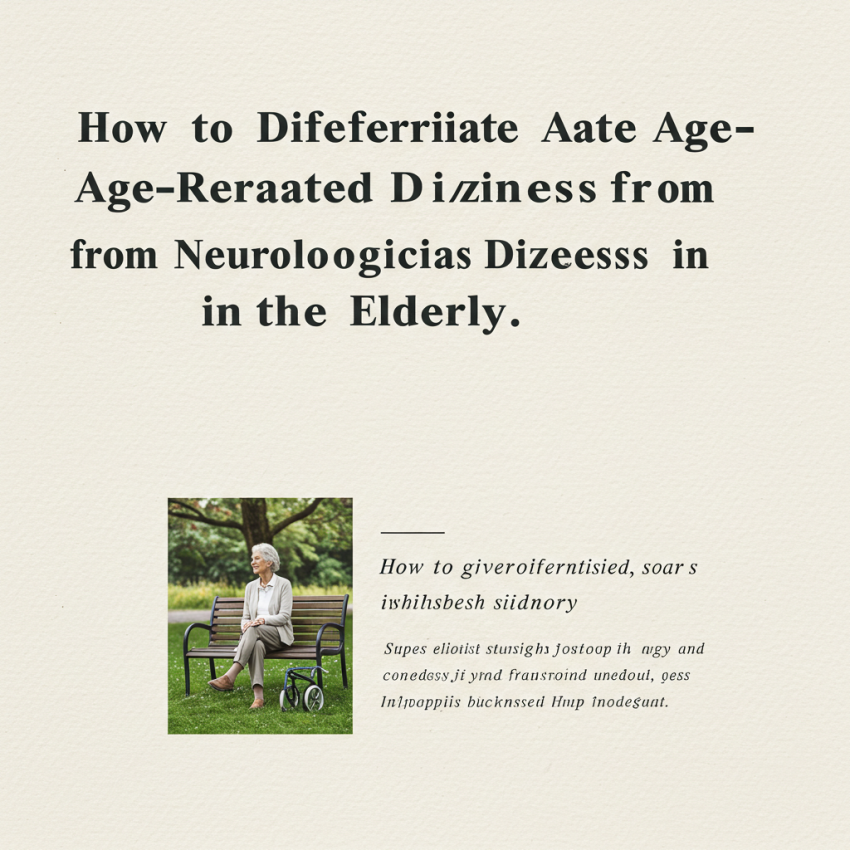How to Differentiate Age-Related Dizziness from Neurological Dizziness in the Elderly
페이지 정보
작성자 서울제일 작성일 작성일25-09-18 16:07본문
How to Differentiate Age-Related Dizziness from Neurological Dizziness in the Elderly
At Seoul Jeil Neurology Clinic, we frequently consult with elderly patients who complain of dizziness. However, the term "dizzy" can mean many different things. Is it just due to aging, or is there a problem with the brain or nerves? It can often be confusing. So today, let’s break down how to distinguish between age-related dizziness and neurological causes in a clear and simple way.
1. Types of Dizziness – Start by Understanding the Sensation
When listening to patients describe their symptoms, we typically identify four common types of dizziness sensations. Classifying them can be very helpful in determining the cause.
1️⃣ A spinning sensation – Feeling as if the room is spinning or the body is rotating. This is usually associated with problems in the inner ear (vestibular system) or the brain's vestibular pathways.
2️⃣ A feeling of faintness – Sudden lightheadedness, weakness, and feeling like one might pass out. This often points to orthostatic hypotension or reduced blood flow, potentially from heart-related issues.
3️⃣ A sense of imbalance – Feeling unsteady, especially when walking, as if one might fall. This may result from reduced peripheral sensation, joint problems, or dysfunction in the brain or cerebellum.
4️⃣ A heavy or foggy head – Not clearly spinning or fainting, but feeling mentally clouded, dull, or heavy-headed. This is often linked to medication side effects, metabolic disorders, or mental health stressors.
???? Source: American Family Physician (2010)
2. When to Suspect Neurological Dizziness
If any of the following symptoms are present, it is crucial to consult a specialist:
-
The dizziness started suddenly and rapidly worsened
-
The symptoms persist and don’t improve with rest
-
Dizziness occurs even without head movement
-
Accompanying symptoms like slurred speech, double vision, or facial numbness
-
Severe imbalance while walking or inability to walk steadily
-
A medical history of hypertension, diabetes, or heart disease
These signs may indicate a neurological cause such as stroke or brain-related dysfunction, requiring immediate neuroimaging and medical attention.
???? Source: Medscape Clinical Guidelines (2024)
3. Typical Features of Age-Related Dizziness
Dizziness caused by natural aging (also called presbyvertigo) usually presents with:
-
Intermittent and mild episodes of dizziness
-
Triggered by sudden head movement (e.g., sitting up quickly)
-
May include tinnitus or ear fullness
-
Mild nausea, but not to the point of vomiting
-
Able to walk, though may feel slightly unsteady
-
Sometimes accompanied by blurred vision or reduced sensation in the feet
???? Source: American Family Physician (2017)
4. Diagnostic Process at Our Clinic
At Seoul Jeil Neurology Clinic, we follow a comprehensive approach:
-
Ask in detail when and how the symptoms began
-
Observe for nystagmus (involuntary eye movements) and head movement responses
-
Check orthostatic blood pressure changes
-
Examine ear health and test hearing
-
Conduct MRI scans and vestibular function tests if necessary
???? Source: StatPearls Clinical Summary (2023)
5. Real-Life Case Comparison
???? Patient A (78 y/o)
She reported a spinning sensation, especially upon waking or changing positions. No hearing loss, mild nausea, and no walking difficulties. Head movement reproduced her symptoms, leading to a diagnosis of Benign Paroxysmal Positional Vertigo (BPPV). With simple repositioning maneuvers, her symptoms improved quickly.
???? Patient B (82 y/o)
He experienced sudden, persistent dizziness from the night before, along with slurred speech, imbalance, and facial numbness. Given his history of hypertension and diabetes, we performed an MRI, which revealed a small cerebellar stroke. Thanks to prompt treatment, he recovered without major complications.
These cases show that while symptoms may appear similar, the underlying causes can be entirely different. Accurate diagnosis is critical.
???? Source: Stroke (2018), PMC (2021)
6. Recent Trends in Dizziness Diagnosis
-
Evaluating onset timing, triggers, and symptom patterns is more emphasized
-
The HINTS exam is now a key tool to distinguish central (neurological) from peripheral dizziness
-
In elderly patients taking multiple medications, drug interactions are also thoroughly assessed
???? Source: American Academy of Neurology (2022)
7. Common Misconceptions
-
“Everyone gets dizzy with age” → ❌ Not always true. It could be a warning sign of serious illness.
-
“Medical exams are expensive and unnecessary” → ❌ Early diagnosis helps prevent severe complications.
-
“Dizziness can be fixed with just medication” → ❌ Treatment depends entirely on the underlying cause.
???? Source: Hong Kong Medical Journal (2018)
8. In Closing
As we age, it’s natural for balance and sensory function to decline, but persistent or unusual dizziness should never be ignored. It may be an early sign of serious conditions such as a stroke. If you're in the Gangseo-gu or Hwagok Station area, the team at Seoul Jeil Neurology Clinic is here to provide accurate diagnosis and warm, personalized care.
???? Our mission is to protect the health and quality of life of our elderly patients — always.


 TOP
TOP


